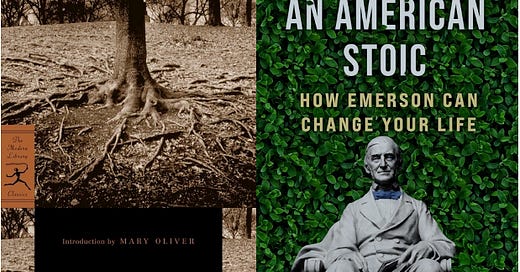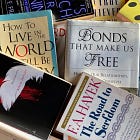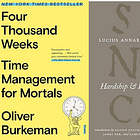Guided by a Living Philosophy: Mindset Shifts U in 2025
“What then can guide us through this life? Philosophy, only philosophy."
“What then can guide us through this life? Philosophy, only philosophy. It preserves the inner spirit, keeping it free from blemish and abuse, master of all pleasures and pains, and prevents it from acting without a purpose or with the intention to deceive, ensuring that we lack nothing, whatever others may do or not do.”—Marcus Aurelius, Meditations, 2.17
A good philosophy facilitates practical daily living. Of course, one’s philosophy can remain dormant, merely acknowledged as a good idea without being practiced.
A thousand times a day, dysfunctional thoughts arise, giving us opportunities to apply what we are learning.
We can subtract barriers to our true Nature by becoming more aware of what is false in our thinking. This subtraction process is at the heart of our work at Mindset Shifts U. To be guided by a living philosophy is the indirect path to reducing our mental suffering and realizing well-being.
For most of us, the direct path to our true Nature rarely produces permanent results. We may feel inspired; something seems to shift, but the gravity of our entrenched mindsets drags us right back.
Why is being dragged right back such a common experience? Our desire to maintain our self-concept outweighs our desire for inner freedom and transcendence. We want our problems solved while keeping our self-concept intact. We want the impossible.
The indirect path of subtraction through awareness and inquiry is an ongoing process. As we become more aware, we gradually reduce the fear that we are surrendering something of value. The benefits of such practice, if even a few times a day, are compounded. The more we practice, the more our identity aligns with our true Nature—our highest values and purpose.
To be a practitioner of a living philosophy does not require perfection. It requires us to pick ourselves up when we fall—without self-judgment—and be a happy learner.
Without a living philosophy acting as a lighthouse, our efforts are ad-hoc, and our energies are scattered. For example, if we have not inquired into the nature of anger, we might go along with our ego’s terrible advice when angry thoughts arise.
Our work is to challenge the lies that our chattering mind feeds us. The lie always begins with the assumption that what we think and feel is our reasonable response to objective, external stimuli.
The voice that speaks for what the late psychiatrist Thomas Hora called the “Sea of Mental Garbage” and contemporary psychiatrist Russ Harris called “Radio Doom and Gloom” is not your voice. Hora’s sea and Harris’s radio continually churn out thoughts that we don’t have to take ownership of. We are able to reject what is false after looking at these miscreations.
Do you remember channel-surfing an old car radio? We quickly moved on if we came across a station broadcasting discordant static.
The problem is the allure of the noisy Sea of Mental Garbage and Radio Doom and Gloom. Their discordant sounds can be wrapped in seductive justifications.
A living philosophy helps us identify seductive justifications. Our goal is not to be free of discordant thoughts, for that is impossible. Our goal is to believe them less often.
When you join Mindset Shifts U, you have access to all previous sessions. As you work with some of the greatest thinkers in history, you will receive their gifts—not perfection, but the gifts of discernment.
The goal is not to perfect our personality or self-concept. Often, such a quest will make things worse. The goal is to gently bypass the worst of our self-concept by taking it less seriously.
What’s new to Mindset Shits U in 2025?
On New Year’s Day I will post a special session of Mindset Shifts U. If you would like to participate, please read a short 1917 essay: Twenty Minutes of Reality by Margaret Prescott Montague.
Montague was in the hospital one dreary day in March when she spontaneously, but temporarily, began seeing the interconnectedness of life. I believe we have had, and can have, Montague-type realizations more often than we think possible. What she saw can teach all of us.
Session 3 of “On Anger” will be posted on January 11th. If you wish to be guided by a living philosophy, Seneca will help you see the many ways you justify what doesn’t serve you.
On January 25th we begin considering Seneca’s essay “On the Shortness of Life” and Oliver Burkeman’s book Four Thousand Weeks. Our Seneca and Burkeman study will last about 8 weeks. Burkeman and Seneca provide actionable and unique insights that help us make the most of our lifetime.
Following Burkeman and Seneca, there is much more to come, including selected essays by Ralph Waldo Emerson.
The great American poet Mary Oliver said of Emerson, “I think of him whenever I set to work on something worthy.”
Like the stoics, Emerson’s philosophy was a practical one.
In 1834, when Ralph Waldo Emerson was thirty, he observed in his journal, “We are always getting ready to live, but never living.” Emerson’s profound insights were still to unfold.
Emerson didn’t fear he was missing out on the things of the world. He traveled but probably would have passed by a modern magazine article titled “Fifty Places You Must Visit Before You Die.” Emerson continued with what he thought was our important work:
We have many years of technical education; then many years of earning a livelihood, and we get sick, and take journeys for our health, and compass land and sea for improvement by travelling, but the work of self-improvement, —always under our nose, nearer than the nearest, is seldom seldom engaged in. A few, few hours in the longest life.
Husband, father, teacher, writer, and lecturer, Emerson was very much in the world while living a quiet life. Yet, to be effective in those roles, he advised himself, “Set out to study a particular truth. Read upon it; walk to think upon it; talk of it; write about it.”
Emerson’s teachings, like everything we consider at Mindset Shifts U, are not merely to be read and filed away as something interesting. Emerson is practical in everyday life.
Emerson concluded his entry with a warning: “Very little life in a lifetime.”
Three years later, Emerson delivered a Phi Beta Kappa address at Harvard. He said, “The office of the scholar is to cheer, to raise, and to guide men by showing them facts amidst appearances.”
Emerson wanted us all to be “scholars” for our own sake and for those we influence.
In 2025, we will take up the challenge so that at the end we don’t say, “very little life.”
We will consider Emerson’s views on individualism and self-reliance and, as we do, popular misconceptions will be cleared up. Emerson’s guidance on friendship, love, prayer, our true Nature, and so much more, will help make each day of our life count.
Besides my overviews to assist with your reading of Emerson’s essays, we will use Lessons from an American Stoic: How Emerson Can Change Your Life by Mark Matousek. Matousek does a masterful job of weaving a sprinkling of Stoic wisdom with Emerson’s philosophy.
Also, in 2025, we will consider the work of David K. Reynolds, whose ideas on Constructive Living will facilitate a lasting shift in your ability to stop feelings from hijacking your life. Constructive Living is Reynold’s Western adaptation of a mixture of Morita and Naikan Japanese therapies. We can get on with life without sorting out our feelings, reducing our anxiety, building our confidence, or quelling our fears. What a relief! Guided by a well-chosen philosophy, we can live according to our highest values and purpose.
On a practicality scale, Reynolds is off the charts. Every day, you will find opportunities to use his ideas.
If you have been on the fence about joining Mindset Shifts U, this upcoming second year of the U will offer value that will pay enormous dividends for the rest of your life.
If you have been reading my Substack for a while, you know there is a connection between inner freedom of the mind and outer freedom in society.
You become a more effective freedom fighter when you gain more inner freedom.
While teaching at the university, a single 3-credit course with me cost nearly $3000. If you are not a paid subscriber, you can become one for less than 20 cents a day.
Your return on your investment by reading and engaging great ideas will likely exceed, by many times, your return from arguing on social media.
If you have the means to become a Founding Member, you will be offering special support for this project. As a thank-you, Founders receive a signed copy of my book, The Inner-Work of Leadership.
All subscribers benefit from a growing Mindset Shifts U community. When questions arise, ask them; you will always have my full attention.






I’m looking forward to these lessons. Exciting times
T he best to you, prof. B Mike